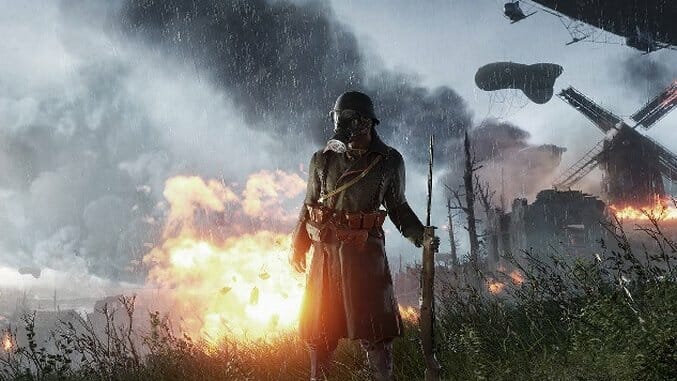Battlefield 1 Can’t Overcome Its Own Restlessness

“In the opinion of one observer the welcoming attitude toward war owed something to the ‘unconscious boredom of peace.’”
— Barbara W. Tuchman, The Guns of August
Battlefield 1 is a restless game. That isn’t entirely surprising given how war shooters usually play out. These are action games before they’re anything else—excuses to pump adrenaline into historical scenarios. War shooters, typically, are more concerned with shooting and explosions than making a real effort to communicate why past events are still remembered today.
At first it seems like developer EA DICE found a way to balance the demands of an action game’s relentless pace with an ambitious reinvention of genre conventions. Battlefield 1’s introductory mission, easily the most impressive part of the entire game, throws players into a suicidal defense on the Western Front, the American Harlem Hellfighters regiment desperately holding their position against a German offense. It begins in standard shooter mode, the soldier popping in and out of cover to put bullets through heads and hurl grenades into masses of advancing troops. But, before long, this character falls against the enemy onslaught. Instead of restarting from a few minutes before, hoping to get it right this time, the game displays the dead soldier’s name and his years of birth and death. The perspective shifts to a new Hellfighter who inevitably dies unceremoniously, too—from, say, being hit by a chunk of stone shrapnel or breathing in a lungful of unexpected mustard gas. The battle goes on, but the player controls a new soldier, then another and another as the grinder of the Great War turns on and on. Eventually, the sequence ends with one exhausted American standing alone amidst the rubble and gore of the battlefield. He faces a similarly battered German. Both men look each other in the eye for a few moments then lower their guns.
It’s hard to overstate how disappointing it is to see the daring of this prologue mission immediately compromised by nearly everything that follows. EA DICE has found a framework in which to merge humane and historically important context with conservative, familiar shooter design, but discards it so quickly that its previous success retrospectively comes across like a fluke.
As if happy to get a somber message out of the way, Battlefield 1 returns to the more familiar framework of individual soldiers doing extraordinarily heroic things throughout the rest of the single-player mode—a set of five more short stories from various theaters of the World War I. There’s a grizzled Australian fighting in the Battle of Gallipoli; an English tank squadron navigating the Battle of Cambrai; an Italian shock trooper pushing the Austro-Hungarians from Northern Italy near the end of the war; an American pilot inadvertently forced into aerial combat in 1917; and a Bedouin woman launching raids against the Ottoman Empire in 1918 as part of the Arab Revolt.
Each of these stories is brief, their few hours sacrificing real historic context in favor of the most exciting action sequences the developer can think up. A chapter will start, in one instance, with a few lines of dialogue explaining that Bedouin rebels are fighting to overthrow the Ottoman Empire with assistance from the British. By the time it ends the player has learned almost nothing about why the Middle East was so highly contested during the war (beyond its wealth of oil), who the Ottomans really were or the sociopolitical motivations that inspired the Arab Revolt.
In large part, the direction and acting are stellar—good enough to sell uneven writing that moves from naturalistic speech to clunkers like the prologue’s on-the-nose voiceover (“Instead of adventure, we found fear. And in war, the only true equalizer . . . is death.”) But, even instances of great presentation aren’t enough to overcome the lack of integration between the cinematic sequences’ storytelling and the nearly context-free design of playing missions that, with their emphasis on standard lone soldier heroics, feel as if they could take place during wars from most any point in the last century.
This is Battlefield 1’s largest problem. Despite its prologue’s willingness to defy the convention of immortal, ever-respawning shooter characters to make a point about the First World War’s collective hopelessness and excessive casualties, the following stories uniformly glorify the individual. In each, strong stoic soldiers take suicidal actions to protect their comrades or turn the tides of battle with lone heroism. The characters may protest otherwise in cutscenes—the Australian runner from the Gallipoli chapter is a jaded living legend who tells an enthusiastic young volunteer that he should’ve just stayed home—but the game takes constant about faces, promoting the idea that combat is not inherently heroic with one breath while showing how martial virtue is what wins wars (and earns special places in history) with the next. If carefully considered this contradiction could be a thematic statement, but Battlefield 1 never figures out what it wants to say. It seems confused as to whether it’s trying to valorize or damn the concept of combat heroism entirely.
-

-

-

-

-

-

-

-

-

-

-

-

-

-

-

-

-

-

-

-

-

-

-

-

-

-

-

-

-

-

-

-

-

-

-

-

-

-

-

-









































